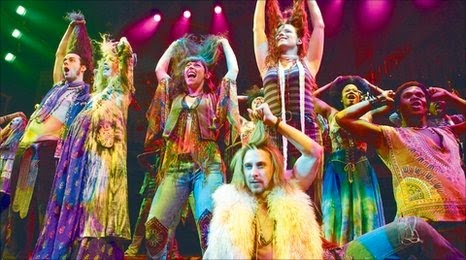I came across this poem by Benjamin Zaphaniah today, 'The British'. It nicely digs at the concept that everyone not born here of white Anglo-Saxon stock is an immigrant and not British whereas it's the mix that makes us British. Most of us are immigrants, whether from 100 years ago or 1,000.
I'm currently reading a book about the history of Northumberland in the Middle Ages - 'The King In The North: The Life And Times of Oswald Of Northumbria' by Max Adams. St Oswald lived around AD 604-642 way back in the mists of time and is remembered by the Venerable Bede in his histories and it's notable that even back then this island is colonised by peoples from all over, from Ireland and Scandinavia, from northern France and from Italy. St Augustin came from Rome and through France to bring his people to Britain and so began the slow war of Roman versus Irish Christianity in this island. It's daft to think of immigration as a new thing since it's been going on for a long, long time.
I blogged about this a few years ago after George Alagiah did his 'Mixed Britannia' series. That bloggie received some hate responses that I deleted and it's quite sad that some people still think there's something 'pure blood' about being British. People from all over the place have been coming to this little island for thousands of years and we, collectively, seem to have done ok from it.
Anyway, here's Benjamin's poem - my favourite line is 'Allow time to be cool':
I'm currently reading a book about the history of Northumberland in the Middle Ages - 'The King In The North: The Life And Times of Oswald Of Northumbria' by Max Adams. St Oswald lived around AD 604-642 way back in the mists of time and is remembered by the Venerable Bede in his histories and it's notable that even back then this island is colonised by peoples from all over, from Ireland and Scandinavia, from northern France and from Italy. St Augustin came from Rome and through France to bring his people to Britain and so began the slow war of Roman versus Irish Christianity in this island. It's daft to think of immigration as a new thing since it's been going on for a long, long time.
I blogged about this a few years ago after George Alagiah did his 'Mixed Britannia' series. That bloggie received some hate responses that I deleted and it's quite sad that some people still think there's something 'pure blood' about being British. People from all over the place have been coming to this little island for thousands of years and we, collectively, seem to have done ok from it.
Anyway, here's Benjamin's poem - my favourite line is 'Allow time to be cool':
The British
Take some Picts, Celts and Silures
And let them settle,
Then overrun them with Roman conquerors.
Remove the Romans after approximately 400 years
Add lots of Norman French to some
Angles, Saxons, Jutes and Vikings, then stir vigorously.
Mix some hot Chileans, cool Jamaicans, Dominicans,
Trinidadians and Bajans with some Ethiopians, Chinese,
Vietnamese and Sudanese.
Then take a blend of Somalians, Sri Lankans, Nigerians
And Pakistanis,
Combine with some Guyanese
And turn up the heat.
Sprinkle some fresh Indians, Malaysians, Bosnians,
Iraqis and Bangladeshis together with some
Afghans, Spanish, Turkish, Kurdish, Japanese
And Palestinians
Then add to the melting pot.
Leave the ingredients to simmer.
As they mix and blend allow their languages to flourish
Binding them together with English.
Allow time to be cool.
Add some unity, understanding, and respect for the future,
Serve with justice
And enjoy.
Note: All the ingredients are equally important. Treating one ingredient better than another will leave a bitter unpleasant taste.
Warning: An unequal spread of justice will damage the people and cause pain. Give justice and equality to all.
And let them settle,
Then overrun them with Roman conquerors.
Remove the Romans after approximately 400 years
Add lots of Norman French to some
Angles, Saxons, Jutes and Vikings, then stir vigorously.
Mix some hot Chileans, cool Jamaicans, Dominicans,
Trinidadians and Bajans with some Ethiopians, Chinese,
Vietnamese and Sudanese.
Then take a blend of Somalians, Sri Lankans, Nigerians
And Pakistanis,
Combine with some Guyanese
And turn up the heat.
Sprinkle some fresh Indians, Malaysians, Bosnians,
Iraqis and Bangladeshis together with some
Afghans, Spanish, Turkish, Kurdish, Japanese
And Palestinians
Then add to the melting pot.
Leave the ingredients to simmer.
As they mix and blend allow their languages to flourish
Binding them together with English.
Allow time to be cool.
Add some unity, understanding, and respect for the future,
Serve with justice
And enjoy.
Note: All the ingredients are equally important. Treating one ingredient better than another will leave a bitter unpleasant taste.
Warning: An unequal spread of justice will damage the people and cause pain. Give justice and equality to all.
Benjamin Zephaniah



























